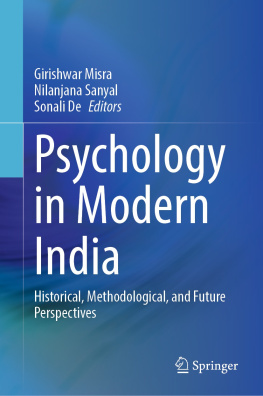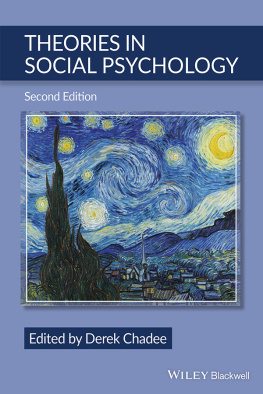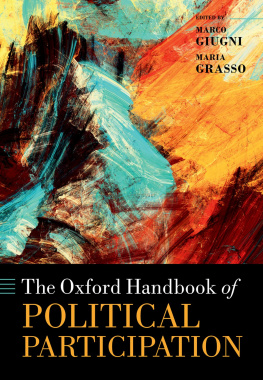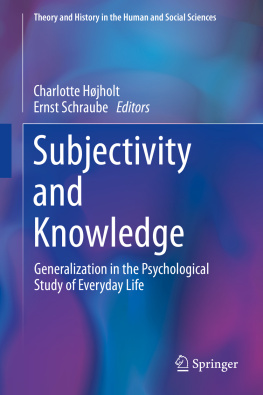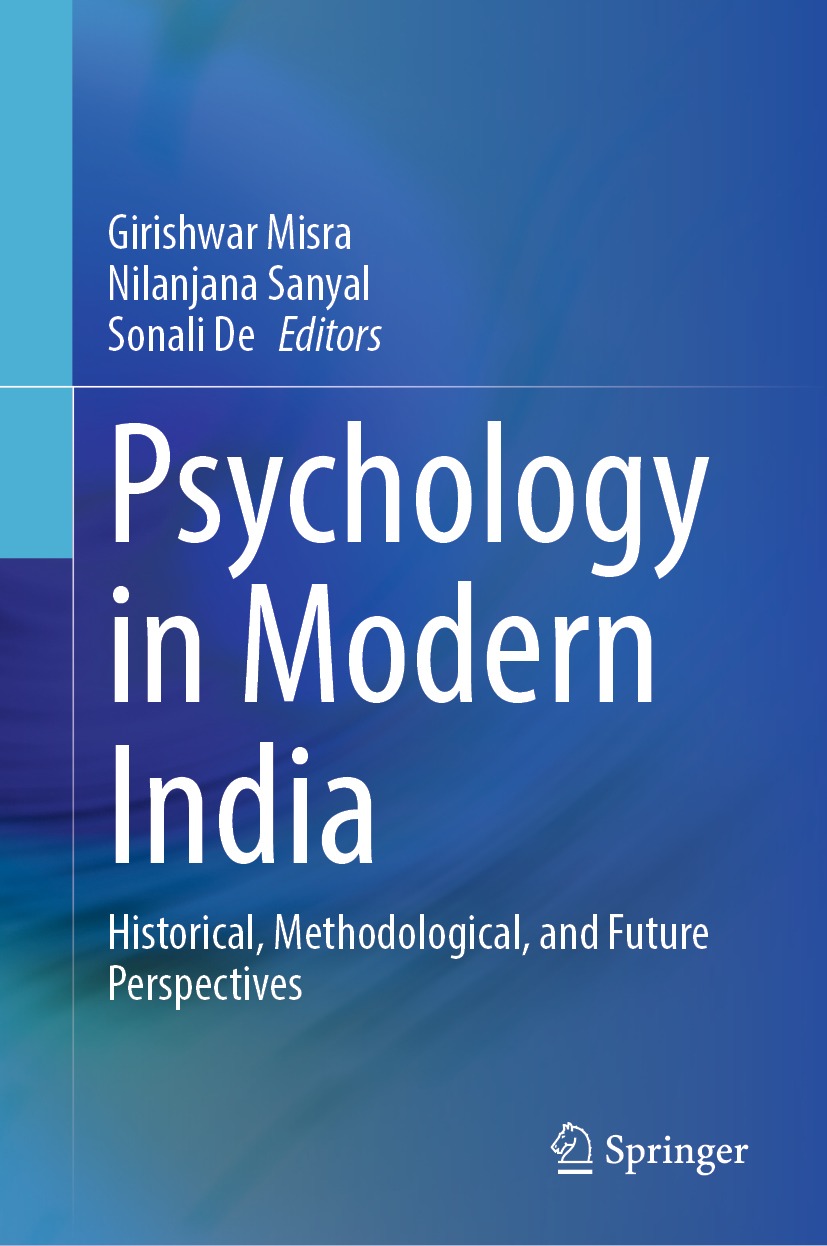Editors
Girishwar Misra , Nilanjana Sanyal and Sonali De
Psychology in Modern India
Historical, Methodological, and Future Perspectives
1st ed. 2021

Logo of the publisher
Editors
Girishwar Misra
Department of Psychology, University of Delhi, Delhi, Delhi, India
Nilanjana Sanyal
Department of Psychology, University of Calcutta, Kolkata, West Bengal, India
Sonali De
Department of Psychology, University of Calcutta, Kolkata, West Bengal, India
ISBN 978-981-16-4704-8 e-ISBN 978-981-16-4705-5
https://doi.org/10.1007/978-981-16-4705-5
Springer Nature Singapore Pte Ltd. 2021
This work is subject to copyright. All rights are reserved by the Publisher, whether the whole or part of the material is concerned, specifically the rights of translation, reprinting, reuse of illustrations, recitation, broadcasting, reproduction on microfilms or in any other physical way, and transmission or information storage and retrieval, electronic adaptation, computer software, or by similar or dissimilar methodology now known or hereafter developed.
The use of general descriptive names, registered names, trademarks, service marks, etc. in this publication does not imply, even in the absence of a specific statement, that such names are exempt from the relevant protective laws and regulations and therefore free for general use.
The publisher, the authors and the editors are safe to assume that the advice and information in this book are believed to be true and accurate at the date of publication. Neither the publisher nor the authors or the editors give a warranty, expressed or implied, with respect to the material contained herein or for any errors or omissions that may have been made. The publisher remains neutral with regard to jurisdictional claims in published maps and institutional affiliations.
This Springer imprint is published by the registered company Springer Nature Singapore Pte Ltd.
The registered company address is: 152 Beach Road, #21-01/04 Gateway East, Singapore 189721, Singapore
Psychology in Modern India is a remarkable breakthrough in the analysis of ideas in psychology where the colonial efforts of the Occident have attempted to subordinate the psychologies of the Orient over the past century. This careful survey of how psychology has developed in India since 1915 is particularly important as it shows new pathways for leaving Euro-American traditions in psychology behind and showing how innovations in psychology are possible on the basis of both the ancient and the contemporary ideas that have grown in the Indian societies.
Jaan Valsiner, Ph.D., Professor of Cultural Psychology, Aalborg University, Editor-in-Chief, Culture & Psychology (Sage), Foreign Member, Estonian Academy of Sciences
It is for the first time to my knowledge that a comprehensive statement about the need for a serious look at Indian perspectives in psychology has been made. Psychology in Modern India: Historical, Methodological and Future Perspectives draws attention to the gross error in following blindly the Western concepts and methodologies. Alternatives are suggested. It was easy to tread the path of Western psychologists. Exploring formulating, teaching, and researching Indian perspective is far more difficult. The book makes this easier to undertake.
Madan N. Palsane, Ph.D., Former Professor and Head, Psychology Department, Pune University, Pune
This edited volume, as its title promises, is a comprehensive book in its scope and delivers a fresh, succinct, and an updated perspective on nearly every covered topic. The volume is well-organized both between chapters and within chapters, and these are well-referenced, with relatively updated references. Throughout the book, the significance of socio-cultural and historical underpinnings is constantly reinforced with suitable examplesboth from theoretical and applied settings. The volume is a valuable resource for the beginners as well as the experienced interested in indigenization from within.
Sagar Sharma, Ph.D. FNA Psy., Former Professor and Head Department of Psychology and Dean Faculty of Arts/Social Sciences, H. P. University, Shimla
As a scientific discipline, psychology in India has been largely influenced by the Western theories and methods and flourished mostly as a borrowed discipline from the West with narrow focus and thus unable to explicate the complexities of the cultural diversity and context. This volume provides a fresh perspective to appreciate the context and the challenges faced by the discipline of psychology in its journey in India. It not only showcases scholarship in the field through a historical and contextual lens, but also throws light on how psychologists can contribute towards doing meaningful research as well as solving problems focussing on the diversity and dynamics of Indian society.
Purnima Singh, Professor of Psychology, Department of Humanities and Social Sciences Indian Institute of Technology Delhi, New Delhi, India
Psychology in Modern India outlines how teaching and research in psychology in India are impacted by Euro-American tradition with utter neglect to our indigenous knowledge. It further emphasizes that there is need to develop a decolonized mind set. Editors have exhorted that we need to develop the spirit of swaraj in our mindset/thought process and develop self-confidence in indigenous knowledge and commitment to apply them in the service of humanity. The book is a must read for students and scholars interested in the history of psychology in India.
Shailendra Singh, Ph.D., Director, Indian Institute of Management Ranchi, Ranchi
Dedicated with gratitude to
the memory of pioneers of psychology in modern India
M. Adisheshiah, Anwar Ansari, S. Anandalakshmy, H. S. Asthana, B. L. Atreya, C. M. Bhatia, G. D. Boaz, Girindrasekhar Bose, Sudhir K. Bose, Maya Deb, Harish C. Ganguli, E. I. George, V. Gopalswamy, P. S. Hundal, Indrasen, M. C. Joshi, Jamuna Prasad, Kali Prasad, V. K. Kothurkar, B. Krishnan, B. Kuppuswamy, S. C. Mitra, S. K. Mitra, S. M. Mohsin, E. G. Parameshwaran, Udai Pareek, G. G. Prabhu, P. H. Prabhu, Radha Nath Rath, Rajnarain, N. N. Sengupta, A. K. P. Sinha, D. Sinha, M. M. Sinha, T. E. Shanmugam, Amar Kumar Singh, S. D. Singh, and L. B. Tripathi
Foreword
It is a pleasure to write a foreword for this excellent volume on psychology in modern India. The editors wisely chose authors who could provide knowledge and insight into the development and contemporary state of psychology in one of the worlds oldest civilizational and intellectual traditions. As wisely, the volume does not concentrate only on contemporary understandings or applications of Western or hegemonic psychological science and professional practice. Rather, the essays cover the rich philosophical, spiritual, and practical traditions that have shaped Indian thought and practice for thousands of years. Psychology in this volume is placed in the contexts of the entirety of human lifethe spiritual, philosophical, developmental, and practical contexts that we all live inand thus, the psychological aspects of life are seen in the truer light provided by these contexts, rather than the shadows and obscurity generated by reliance on sterile, artificial laboratory experiments.

